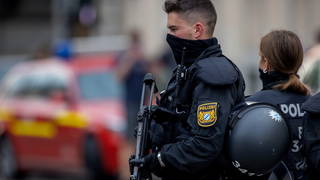


Police in Germany have arrested a German-Iranian citizen on suspicion that he exported €1.1 million of equipment to Iranian firms blacklisted by the EU for use in Tehran’s nuclear program.
On Tuesday, Germany’s public prosecutor announced that the man, referred to only as Alexander J., was arrested in the Segeberg district of Schleswig-Holstein. The federal prosecutor’s office said that 11 properties in Schleswig-Holstein, Hamburg and North Rhine-Westphalia – including the accused’s home and business premises – have been searched as part of their investigation.
It is alleged that the suspect had shipped some €1.1 million worth of equipment to an Iranian associate whose firms were blacklisted by the EU as a front to purchase technology for Iran’s nuclear program.ALSO ON RT.COMWestern govts ditch resolution to slam Iran at IAEA despite Tehran failing to give ‘promise’ on certain questions
The prosecutor said the accused had been approached in 2018 and 2019 to locate and export laboratory equipment. Investigators claim he procured two spectrometers for €166,000 ($196,510) and shipped them to Iran in January 2020. Six months later, he allegedly did this again, procuring two more for €388,000. He did not apply for a special export license which would have been required for such a transaction.
Two more co-accused are still at large, prosecutors said, and are being sought by German authorities.
Iran’s nuclear program has put it at odds with the US and its Western allies, and Washington-Tehran tensions have worsened since 2018, when then-US President Donald Trump elected to pull America out of the 2015 nuclear deal. That deal, the Joint Comprehensive Plan of Action (JCPOA), had put constraints on Iranian nuclear aspirations in exchange for sanctions relief. The US has imposed a series of harsh sanctions on Iran since Washington unilaterally abandoned the nuclear agreement.
Iran has further hollowed out the deal, increasing its enrichment program far in excess of the previously agreed 3.67% level, but less than the 90% level considered weapons-grade. In April, Tehran stated it would enhance its uranium enrichment to 60%, following an alleged Israeli attack on its Natanz nuclear facility.
Negotiations in Vienna to bring the US and Iran back to the nuclear pact have been ongoing for months. The JCPOA was originally signed in 2015 between Iran, China, France, Germany, Russia, the UK, US and EU.
Credit: RT News
